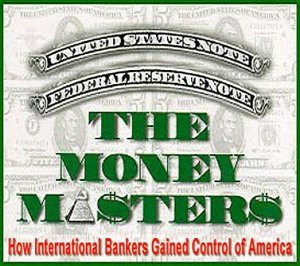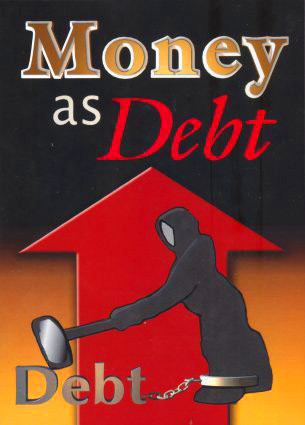


POSITIVE MONEY
Articulos Recientes

Courtesy of the Venus Project


Minority rules:
Scientists discover tipping point for the spread of ideas
Scientists at Rensselaer Polytechnic Institute have found that when just 10 percent of the population holds an unshakable belief, their belief will always be adopted by the majority of the society. The scientists, who are members of the Social Cognitive Networks Academic Research Center (SCNARC) at Rensselaer, used computational and analytical methods to discover the tipping point where a minority belief becomes the majority opinion. The finding has implications for the study and influence of societal interactions ranging from the spread of innovations to the movement of political ideals.
CLICK HERE for more
What this means is we only need 10% of the population to understand how these few individuals are robbing us and enslaving us to transform the narrative society believes in, to stop them.
Scientists discover tipping point for the spread of ideas
Scientists at Rensselaer Polytechnic Institute have found that when just 10 percent of the population holds an unshakable belief, their belief will always be adopted by the majority of the society. The scientists, who are members of the Social Cognitive Networks Academic Research Center (SCNARC) at Rensselaer, used computational and analytical methods to discover the tipping point where a minority belief becomes the majority opinion. The finding has implications for the study and influence of societal interactions ranging from the spread of innovations to the movement of political ideals.
CLICK HERE for more
What this means is we only need 10% of the population to understand how these few individuals are robbing us and enslaving us to transform the narrative society believes in, to stop them.

Venezuela Responde al Ataque
La Dignidad de Venezuela confirmada despues de la Injuria Gringa en la ONUComentario por Rafael Zambrana Enero 17, 2019
La respuesta del Canciller Venezolano Jorge Arreaza fue aplastante despues de verse obligado a escuchar las calumnias y acusaciones hipocritas del marrano gringo representante de EEUU en las Naciones Unidas. La Dignidad Venezolana como un pais clave en la Independencia de toda Latinoamerica de Espania, fue salvada gracias a la entereza y capacidad de este representante de la hermana Republica Bolivariana de Venezuela.
Como se puede ver en el otro video debajo, las acusaciones hechas en las Naciones Unidas por el representante del Imperialismo Yanqui son dificles de escuchar, sobre todo sabiendo que han sido principalmente las sanciones economicas y financieras por las que el pueblo mas vulnerable Venezolano esta sufriendo, siendo que son estos acusadores mismos quienes han creado las condiciones precarias para el desavasto que sufren.
No es nada sorprendente que nuevamente la Oligarquia local e internacional se unan para crear el desamparo en los ciudadanos de algun pais en particular, para convertirlos en sus agentes de turno para derrocar a gobiernos que se niegan a aceptar corromperse y estar bajo sus ordenes en el robo de los bienes sociales.
Esta exacta misma formula se ha venido aplicando en muchos paises desde el siglo pasado cuando en 1953 el gran lider Irani Mohammed Mossadegh fue derrocado por una muchedumbre asalariada por nada menos que Kermit Roosevelt, el primo del famoso presidente de EEUU Franklin Del ano Roosevelt trabajando para la CIA, el Golpe de Estado contra Jacobo Arbenz en Guatemala en 1954, Golpe de Estado en Brasil en 1964 contra Joao Goulart, Golpe de Estado en Chile en 1973 contra el gobierno democratico de Salvado Allende, El Golpe de Estado en Argentina contra Maria Estela Martines de Peron en 1976, intento de Golpe de Estado contra Hugo Chavez de Venezuela en 2002, Golpe de Estado en Honduras en 2009 contra el presidente electo Manuel Zelaya, y ahora tenemos la misma formula siendo aplicada contra el presidente electo Nicolas Maduro en Venezuela, hundiendo en la zozobra y la inseguridad a la gente mas vulnerable y pobre para obligarla con la desesperacion a levantarse en contra de su gobierno para derrocarlo.
Escepto que Maduro siendo ya consciente de esta formula se les adelanto a los psicopatas oligarcas locales y yanquis, poniendo en practica el plan de darles a la ciudadania mas pobre, un sustento minimo para poder resolver sus mas basicas necesidades con comida y un techo sobre la cabeza y esto ha resultado en mantener un apoyo masivo a su administracion, dandole suficientes votos para mantener a Nicolas Maduro en el poder y asi defender los recursos minerales y petroleros de la nacion caribenia.
Esta exacta misma formula se ha venido aplicando en muchos paises desde el siglo pasado cuando en 1953 el gran lider Irani Mohammed Mossadegh fue derrocado por una muchedumbre asalariada por nada menos que Kermit Roosevelt, el primo del famoso presidente de EEUU Franklin Del ano Roosevelt trabajando para la CIA, el Golpe de Estado contra Jacobo Arbenz en Guatemala en 1954, Golpe de Estado en Brasil en 1964 contra Joao Goulart, Golpe de Estado en Chile en 1973 contra el gobierno democratico de Salvado Allende, El Golpe de Estado en Argentina contra Maria Estela Martines de Peron en 1976, intento de Golpe de Estado contra Hugo Chavez de Venezuela en 2002, Golpe de Estado en Honduras en 2009 contra el presidente electo Manuel Zelaya, y ahora tenemos la misma formula siendo aplicada contra el presidente electo Nicolas Maduro en Venezuela, hundiendo en la zozobra y la inseguridad a la gente mas vulnerable y pobre para obligarla con la desesperacion a levantarse en contra de su gobierno para derrocarlo.
Escepto que Maduro siendo ya consciente de esta formula se les adelanto a los psicopatas oligarcas locales y yanquis, poniendo en practica el plan de darles a la ciudadania mas pobre, un sustento minimo para poder resolver sus mas basicas necesidades con comida y un techo sobre la cabeza y esto ha resultado en mantener un apoyo masivo a su administracion, dandole suficientes votos para mantener a Nicolas Maduro en el poder y asi defender los recursos minerales y petroleros de la nacion caribenia.
Para presionar al gobierno de Maduro y empeorar la situacion precaria de los Venezolanos y asi convertirlos en agentes involuntarios en contra de su gobierno, Inglaterra nego la entrega del oro del pais Venezuela a su gobierno actual, ademas de que EEUU congelo los fondos de Venezuela en EEUU y los recursos del pais con las gasolinerias de la cadena distribuidora CITGO los ha puesto al servicio del usurpador Juan Guaido para apoyar el golpe de estado.




2da intervención de Jorge Arreaza defendiendo a Venezuela en Consejo de Seguridad de la ONU
Four Effects of the Blockade Against Venezuela
The financial blockade directly affects routine international payments for goods and services.
US economic sanctions are impeding the Venezuelan government from paying for vital imports. (Archive)
1. Funds were frozen for the import of insulin Ever since President Donald Trump's imposition of US financial sanctions against Venezuela in August, the Venezuelan state has confronted various difficulties trying to import medicines and foodstuffs not produced domestically. The financial blockade directly affects routine international payments for goods and services. The Venezuelan government has repeatedly condemned this. On Sept. 7, President Nicolas Maduro denounced in the National Constituent Assembly the hold up in an international port of a cargo of over 300,000 doses of insulin, thanks to the "Donald Trump-Julio Borges pact." President Maduro explained that the U.S.-based Citibank financial institution refused to receive the money Venezuela was depositing to pay for the importation of this huge cargo of insulin for diabetic patients. As a result, the insulin shipment was held up for many days in port. President Maduro explained, "Even though we have the money to pay, they do not accept it." "Starting this week, I hold Trump and Borges responsible for the blockade of medicines," President Maduro said, referring to the requests during 2017 by the leader of the Justice First party for these boycott measures.
2. Colombia's blockade of malaria medicine On Nov. 3, Vice President Tareck El Aissami, denounced that Venezuela had purchased in Colombia a shipment of Primaquine, an anti-malaria medicine, but, "Once the laboratory (BSN Medical) knew the final destination was the Bolivarian Republic of Venezuela's Health Ministry, it arbitrarily blocked the dispatch of this medicine on the orders of Colombia’s president.” President Maduro confirmed this saying, "When we already had the money to buy the medicines and went to pay for them, the Colombian government forbade the sale of these anti-malaria medicines to the Venezuelan people. We will purchase them elsewhere, people in Venezuela will not lack the medicines to combat these diseases." In fact, the Primaquine and other medicines for chronic illnesses had to be purchased in India.
3. Suspension of funds for buying food One year ago, Freddy Bernal, secretary general of the Local Production and Supply Committees (CLAPs), denounced that, already back then, Venezuela was suffering an intense blockade of food imports. He noted that, as part of the financial war against Venezuela, international banks suspended payments to foreign suppliers for three months holding up the arrival of 29 container ships carrying supplies needed to process and produce food products in Venezuela. Bernal explained, "We spent 68 days looking for ways to pay and of course we have had to tell the country that this badly affected food distribution." The CLAP food packages have drastically reduced the effects of shortages and inflation resulting from both the attacks on Venezuela's currency and also the economic siege from overseas. But, this past September, 18 million packages could not be distributed because payments were blocked. Venezuela's authorities had to work with various allied countries to triangulate payments so as to bring the food products to Venezuela. Chavista leader Aristóbulo Istúriz condemned this sinister development before the National Council of Economic Production explaining that once the food products were paid for, a shipping boycott was organized, which meant the 600 containers involved had to be shipped 100 at a time instead of arriving in a single shipment. Given these obstacles, clearly brought about by the powerful, hegemonic states opposed to Venezuela, the government recently entered into contracts for weekly imports from Mexico and Panama of more than 1.5 million packages of basic food products into the ports of La Guaira in Vargas state and Puerto Cabello in Carabobo state for distribution across the country via the CLAPs.
4. Blocking of payments for travel by Venezuelan sports teams But medicines and foods are not the only major expressions of the de facto blockade imposed on Venezuela's people. Sports are also affected. President Maduro also denounced in the National Constituent Assembly that, on Sept. 6, an international bank informed the Bolivarian government that it was "impossible" to carry out payments by Venezuela to a U.S. financial institution refusing to process the transfer of US$1.5 million from the Sports Ministry to pay suppliers of airline tickets, accommodation and other needs of leading athletes in various Venezuelan sports delegations. Although the government tried to unblock the payments in order to pay for travel, accommodation and related expenses, President Maduro decided to place government airplanes at the athletes' disposal, most especially Venezuela's female volleyball team, whose participation in the 2017 South American championships was jeopardized by the U.S. blockade against Venezuela. The increase in areas affected by the international blockade against Venezuela is matched by the corresponding government responses to ensure the necessary protection of all Venezuela's people. International alliances with the bloc of countries challenging U.S. hegemony have allowed Venezuela, with difficulty, to cope with the U.S. authorities' tough measures which are aimed at fomenting social conditions clearing the way for the overthrow of the Chavista government. The blockade is applied so as to affect Venezuela's population directly, but the government has acted to neutralize or at least mitigate the effects of the "Trump-Borges pact," a new way of describing the U.S. intervention and coup.
Empresario Vasco residente explica el boicot farmaceutico contra Venezuela
La contundente defensa de Rusia a Venezuela en el consejo de seguridad de la ONU